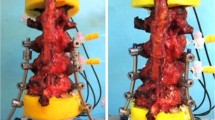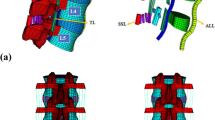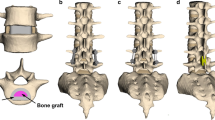Abstract
Objectives
To assess the changes of intradiscal pressure at the bridged and at the adjacent levels to a lumbar two-level hybrid instrumentation.
Introduction
The elimination of motion produced by spinal fusion may have potential consequences beyond the index level overloading the juxtaposed spinal motion segments and leading to the appearance of degenerative changes. Degeneration of the segments adjacent to instrumented levels has become a topic of increasing interest in the literature over the last years. In order to prevent degenerative disc changes at the adjacent segments to a fused level, a broad scope of techniques have been developed, one of them is hybrid constructs.
Methods
In 6 human cadaveric lumbosacral specimens, pressure transducers quantified intradiscal pressure changes at three levels (L3–L4, L4–L5 and L5–S1) under axial compression (0–750 N), anterior flexion (+12°) and extension (−12°) in three different situations of spinal stability: intact, L5–S1 rigid rod pedicle screw instrumentation and L4–S1 two-level hybrid instrumentation (rigid at L5–S1 and dynamic at L4–L5).
Results
Once the L5–S1 segment had implanted the rigid instrumentation system (Diapason), the intradiscal pressure at this level decreased by 65 % while the intradiscal pressure at the disc above (L4–L5) increased 20 %. After augmenting the L5–S1 posterior construct with a dynamic stabilization device (Dynesys) at the superior adjacent level, the intradiscal pressure at this level, L4–L5, decreased by 50 % whereas intradiscal pressure at its adjacent level, L3–L4, only experienced a slight increase of 10 %.
Conclusions
The raise of intradiscal pressure at the adjacent segment to a rigid instrumented segment can be reduced when the rigid construct is augmented with a dynamic stabilization device. Hybrid constructs might have a possible protecting role preventing the occurrence of degenerative disc changes at the adjacent segment to a rigid instrumented level. Augmentation with a dynamic stabilization device might protect the disc above a rigid rod pedicle screw construct.






Similar content being viewed by others
References
Adams MA (1995) Mechanical testing of the spine. An appraisal of methodology, results, and conclusions. Spine 20:2151–2156
Andersen T, Christensen FB, Hansen ES, Bunger C (2004) Pain 5 years after instrumented and non-instrumented posterolateral lumbar spinal fusion. Eur Spine J 12:393–399
Beastall J, Karadimas E, Siddiqui M, Nicol M, Hughes J, Smith F et al (2007) The Dynesys lumbar spinal stabilization system: a preliminary report on positional magnetic resonance imaging findings. Spine 32:685–690
Chow DH, Luk KD, Evans JH, Leong JC (1996) Effects of short anterior lumbar interbody fusion on biomechanics of neighboring unfused segments. Spine 21:549–555
Cunningham BW, Kotani Y, McNulty PS, Cappuccino A, McAfee PC (1997) The effect of spinal destabilization and instrumentation on lumbar intradiscal pressure: an in vitro biomechanical analysis. Spine 122:2655–2663
Dolan P, Earley M, Adams MA (1994) Bending and compressive stresses acting on the lumbar spine during lifting activities. J Biomech 27:1237–1248
Etebar S, Cahill DW (1999) Risk factors for adjacent-segment failure following lumbar fixation with rigid instrumentation for degenerative instability. J Neurosurg 90:163–169
Faraj AA, Webb JK (1997) Early complications of spinal pedicle screw. Eur Spine J 6:324–326
Fritzell P, Hagg O, Nordwall A (2003) Complications in lumbar fusion surgery for chronic low back pain: comparison of three surgical techniques used in a prospective randomized study. A report from the Swedish Lumbar Spine Study Group. Eur Spine J 12:178–189
Fritzell P, Hagg O, Wessberg P, Nordwall A (2002) Chronic low back pain and fusion: a comparison of three surgical techniques: a prospective multicenter randomized study from the Swedish lumbar spine study group. Spine 27:1131–1141
Ghiselli G, Wang JC, Bhatia NN, Hsu WK, Dawson EG (2004) Adjacent segment degeneration in the lumbar spine. J Bone Joint Surg Am 86-A:1497–1503
Grob D, Benini A, Junge A, Mannion AF (2005) Clinical experience with the Dynesys semirigid fixation system for the lumbar spine: surgical and patient-oriented outcome in 50 cases after an average of 2 years. Spine 30:324–331
Guehring T, Omlor GW, Lorenz H, Engelleiter K, Richter W, Carstens C et al (2006) Disc distraction shows evidence of regenerative potential in degenerated intervertebral discs as evaluated by protein expression, magnetic resonance imaging, and messenger ribonucleic acid expression analysis. Spine 31:1658–1665
Handa T, Ishihara H, Ohshima H, Osada R, Tsuji H, Obata K (1997) Effects of hydrostatic pressure on matrix synthesis and matrix metalloproteinase production in the human lumbar intervertebral disc. Spine 22:1085–1091
Kroeber M, Unglaub F, Guehring T, Nerlich A, Jadi T, Lotz J et al (2005) Effects of controlled dynamic disc distraction on degenerated intervertebral discs: an in vivo study on the rabbit lumbar spine model. Spine 30:181–187
Morishita Y, Ohta H, Naito M, Matsumoto Y, Huang G, Tatsumi M et al (2011) Kinematic evaluation of the adjacent segments after lumbar instrumented surgery: a comparison between rigid fusion and dynamic non-fusion stabilization. Eur Spine J 20:1480–1485
Mulholland RC, Sengupta DK (2002) Rationale, principles and experimental evaluation of the concept of soft stabilization. Eur Spine J 11(Suppl 2):S198–S205
Nockels RP (2005) Dynamic stabilization in the surgical Management of painful lumbar spinal disorders. Spine 30:S68–S72
Pihlajamaki H, Myllynen P, Bostman O (1997) Complications of transpedicular lumbosacral fixation for non-traumatic disorders. J Bone Joint Surg Br 79:183–189
Rahm MD, Hall BB (1996) Adjacent-segment degeneration alter lumbar fusion with instrumentation: a retrospective study. J Spinal Disord 9:392–400
Rao RD, David KS, Wang M (2005) Biomechanical changes at adjacent segments following anterior lumbar interbody fusion using tapered cages. Spine 30:2772–2776
Schilling C, Krüger S, Grupp TM, Duda GM, Blöme W, Rohlmann A et al (2011) The effect of design parameters of dynamic pedicle screw systems on kinematics and load bearing: an in vitro study. Eur Spine J 20:297–307
Schmoelz W, Huber JF, Nydegger T, Claes L, Wilke HJ (2006) Influence of a dynamic stabilisation system on load bearing of a bridged disc: an in vitro study of intradiscal pressure. Eur Spine J 15:1276–1285
Sengupta DK (2004) Dynamic stabilization devices in the treatment of low back pain. Orthop Clin North Am 35:43–56
Weinhoffer SL, Guyer RD, Herbert M, Griffith SL (1995) Intradiscal pressure measurements above an instrumented fusion. A cadaveric study. Spine 20(5):526–531
Wilke HJ, Neef P, Caimi M, Hoogland T, Claes LE (1999) New in vivo measurements of pressures in the intervertebral disc in daily life. Spine 24:755–762
Author information
Authors and Affiliations
Corresponding author
Rights and permissions
About this article
Cite this article
Cabello, J., Cavanilles-Walker, J.M., Iborra, M. et al. The protective role of dynamic stabilization on the adjacent disc to a rigid instrumented level. An in vitro biomechanical analysis. Arch Orthop Trauma Surg 133, 443–448 (2013). https://doi.org/10.1007/s00402-013-1685-x
Received:
Published:
Issue Date:
DOI: https://doi.org/10.1007/s00402-013-1685-x




